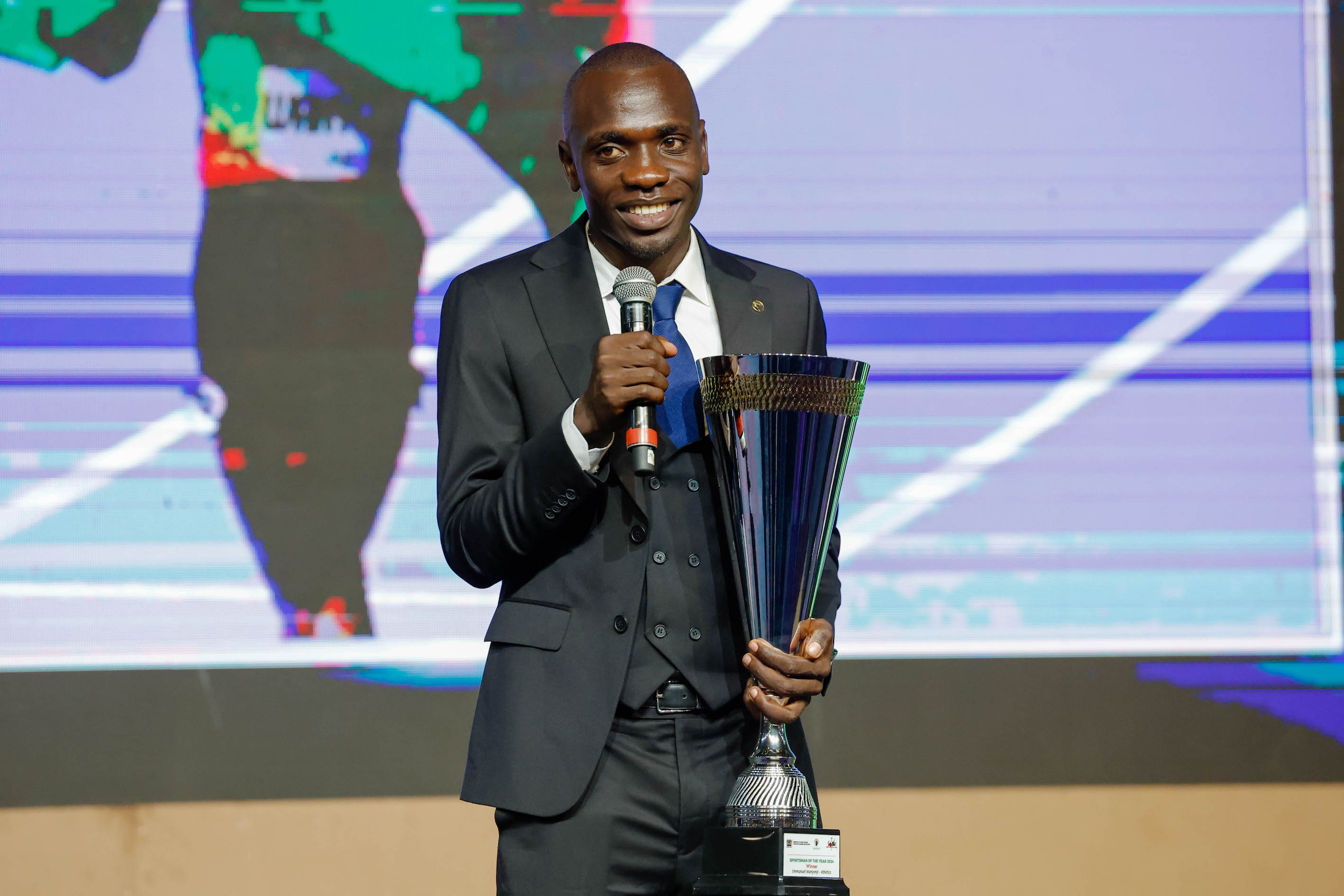 Olympic 800m champion Emmanuel Wanyonyi moves his acceptance speech after being named the 2024 Sportsman of the Year at the Soya awards gala on April 17/HANDOUT
Olympic 800m champion Emmanuel Wanyonyi moves his acceptance speech after being named the 2024 Sportsman of the Year at the Soya awards gala on April 17/HANDOUT
The significant contributions of our female athletes and teams were aptly epitomised through this year’s theme “Celebrating Women’s Excellence in Sports.”
The top honours were no surprises, with Olympic 800m champion Emmanuel Wanyonyi and Olympic 10,000m and 5,000m champion Beatrice Chebet being crowned Sports Man of the Year and Sports Woman of the Year 2024, respectively.
Chebet was not present to receive her trophy, leaving Wanyonyi the only available recipient and speaker of the night.
His speech had nothing out of the ordinary; in the usual fashion, he thanked God for a great year and family.
What followed were lamentations, highlighting challenges that he and other athletes encounter during training.
That our athletes strive to earn the medals they bring home is a no-brainer, but one could not help but wonder how they have managed to become repeat world record beaters faced with so many challenges.
Could these challenges be the reason why the first- and second-place finishers in the Boston Marathon last weekend, Sharon Lokedi and Hellen Obiri, have both relocated their training base to the United States?
Last year, when Kenyan-born Winfred Yavi won a gold medal for Bahrain at the Paris Olympics, Kenyans groaned, “We are losing our talent to developed countries."
While the cries are justifiable, it begs the question: are our athletes ahead of what we can offer as a country? Do we have the necessary infrastructure for coaching and facilities for high performance? The simple answer is no.
None of the 50-plus registered sports in Kenya can claim to have enough systems, structures, and facilities to produce world champions. Other than athletics, the other 26 Olympic sports can only pray to qualify for the games with a podium finish, a distant dream.
The buck, however, stops with the government and federations. Granted, the government must prioritise the many needs we have as citizens, such as health, education, security, and infrastructure.
We must commend the government’s goodwill and funding in hosting and supporting major events like the World Rally Championship (WRC), Magical Kenya Open, and Africa Cup of Nations, not to mention the progress being made in the construction of new stadiums.
Today, unlike in the past, the government has been guaranteeing travel and allowances for all major championships, lifting a huge burden in games participation.
This leaves the design of high-performance structures to federations, who have shrunk their role to solely facilitating travel to major championships, while athletes cater to their own training development. That's the greatest misdoing to our sportsmen and sportswomen.
Training athletes for high performance requires a lot of money. Having exhausted government budgets on the big-ticket items, federations must find alternative revenue streams to fund development and coaching.
In the world of sports, marketing these streams includes gate collections, broadcast rights, sale of merchandise and corporate sponsorship. The broadcast sector is yet to develop an appetite for ‘Live’ broadcast.
Except for Gor Mahia, AFC Leopards and Shabana, no other team or sport can claim to have gate collections as a revenue stream, narrowing down the options to corporate sponsorship.
However, federations have done little to position themselves as dependable partners for the corporate world.
Instead, they are in constant tug of boardroom wrangles and poor governance. This pushes potential corporate collaborations away as they must protect their brand and reputation.
As I write this, the National Olympic Committee of Kenya (NOCK) elections that were scheduled for April 24 stand postponed indefinitely, as several member federations could not agree on who should vote.
A clear demonstration of the lack of governance structures in federations. It is indeed unfortunate that the new NOCK leadership will have to start from a challenging position.
Paul Tergat’s team worked diligently over the past eight years to rebuild trust and improve the committee’s image following the 2016 Rio Olympics scandal.
The Rio fiasco involved significant mismanagement and corruption, leading to fines and prison sentences for several officials.
Despite these efforts, the election wrangles today will set the new office back, and they will need to continue addressing these image issues at the expense of the 2028 Los Angeles Olympic Games preparation.
Several other federations have ongoing court cases on issues that have nothing to do with the actual sport or the sportsmen thereof. Others haven’t held elections in more than five years.
Good governance is crucial for sports federations. Without it, they risk losing corporate sponsorships, which are vital for funding and development.
Without additional funding, federations’ roles will be reduced to merely arranging travel for inadequately prepared teams to major championships.
The writer is the CEO of Inter Management Group (IMG Kenya)






![[PHOTOS] Guardian Angel bus catches fire in Kikuyu](/_next/image?url=https%3A%2F%2Fcdn.radioafrica.digital%2Fimage%2F2025%2F04%2F58287f0a-f201-4a78-87f0-6f147ad8ba8a.jpg&w=3840&q=100)




